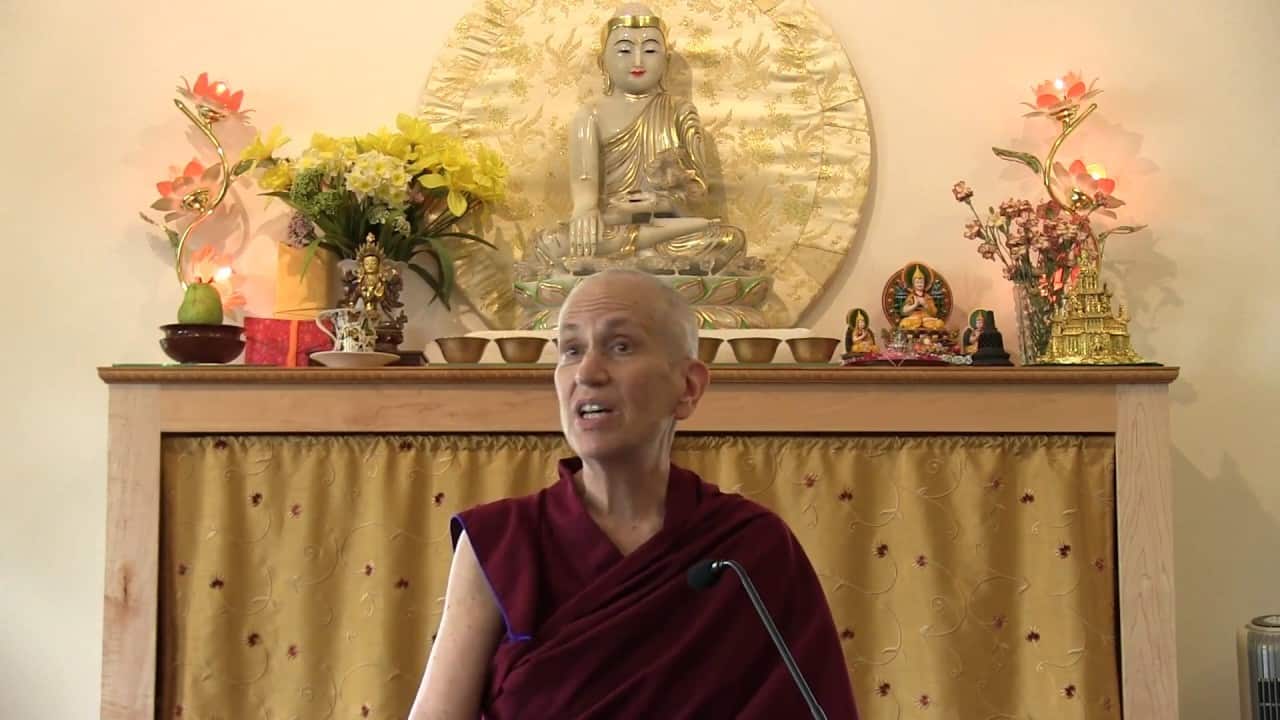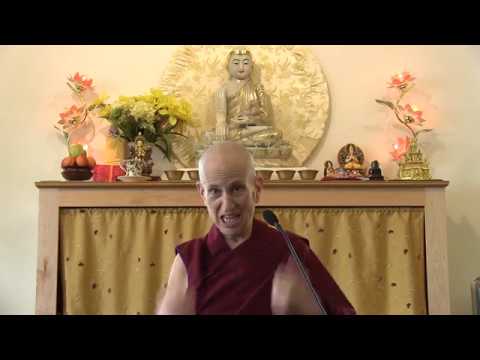Living in harmony with one another
Part of a series of short talks on the pithy verses from the end of Lama Yeshe's book When the Chocolate Runs Out.
- How the self-centered thought throws a wrench in everything we do
- The disharmony we have with others and with ourselves
- How to look at ourselves constructively
Another one of Lama’s short “sock it to you” phrases. These are like the Kadampa sayings, they’re so short and sweet, but when you look at all the practice you have to do…. There’s a lot included here.
This one says:
Live in harmony with one another.
and be an example of
peace, love, compassion, and wisdom
Living in harmony we hear a lot about in the vinaya, about how important that is. To live in harmony with other monastics. The Buddha says that the existence of the Dharma depends on the sangha being harmonious. Because if the sangha is fractured, then nobody can practice properly. Everybody is too busy quarreling. Nobody practices properly, then what happens to the lay community when the sangha doesn’t practice properly?
Of course, what Lama is saying here isn’t only directed at the sangha. He’s talking to everybody at the Dharma centers, too, and people in general in society, your family, in your workplace, wherever you are.
Harmony is something difficult. As we all know, as the saying goes, I want what I want when I want it. That’s kind of the motto, or the brand, of our self-centered thought. I want what I want when I want it. And I don’t want what I don’t want when I don’t want it. That attitude which is so deeply ingrained in our minds, that’s what throws all the wrenches in everything that we do. Situations are going along and things are fine, and then there’s one little detail, or something isn’t exactly the way we want it, and our mind explodes. Somebody puts that spatula in the wrong place and the world is coming to an end. We just get exasperated and frustrated and angry. Then we exercise our thumbs this way [mimes texting], we exercise our fingers this way [pointing fingers]. This finger exercise is “it’s your fault, and you need to change.” We start pointing fingers at the entire planet, when actually the only thing that we can ever control and modify is this one [ourselves]. We want the world to change, but we aren’t willing to change.
When you think of it that way…. I expect everything else to change, to be what I want, but I’m not willing to change anything. My ideas are my ideas, and that’s it. And that is what creates so much disharmony.
That’s the disharmony with others. There’s also the disharmony we have inside ourselves, which the Dharma doesn’t always talk about so directly. But I think the two are linked, because the disharmony inside of ourselves…. When we do point this way (to ourselves) we’re not doing it in the correct way. It’s “you’re such a problem, you do everything wrong, you’re so confused, you’re worthless, if everybody really knew how you are nobody would speak to you….” All that kind of pointing the finger here (at ourselves). Which, again, is totally unrealistic, creates disharmony in our own mind. Of course, when we have disharmony in our own mind, then we’re frustrated, we’re unhappy, how do we speak to others when we’re unhappy? And so the whole thing just goes on and on.
The thing is, really, to hold harmony as a priority, with others and also within ourselves. When we see that we’re creating disharmony by having strong self-centered thought that’s insisting on our way “or else,” then ask ourselves is this really necessary? What do they say? You win the battle, but you lose the war.
I remember one of our friends being here and telling us that she and her husband were in counseling together because they weren’t getting along, and he was just always insisting on winning everything and getting his way, and the therapist finally looked at him and said, “You can either insist on getting your way, or you can love her. And you have to decide which one you want to do.” Because if you really care about other people, then we can’t always insist on getting our way. And then of course as His Holiness says, if you want to be selfish, be wisely selfish and take care of others, because then we live with other people who are happy and satisfied, which makes our life nicer. So to really remember that when our mind gets stuck in the spatula story. And that spatula is so important.
The other thing is when we’re pointing the finger inside in a really self-critical, unrealistic way, to identify that and to realize that that’s not true. It’s very helpful, I find, write down those self-critical thoughts and then just look at them, and they always have extreme statements. “I am worthless.” That’s pretty extreme, isn’t it? In other words, I can’t do anything right, I’m not valued, I can’t contribute to anything. Is that true? Is that true that we’re 100% worthless? That’s not true at all. “I can’t do anything right.” Really? Nothing? Totally nothing? When you look at these extreme statements they’re all just garbage. So to be able to look at them very squarely and to say, “Is that true?” And if it’s not true, then you throw it out like a hot potato. Throw it out. In that way, let your mind be harmonious. To be harmonious with other people, to look at the things that we appreciate about them, and all that they do that influences us in a positive way. That really changes our feeling and helps us be harmonious with the people we live with. Being harmonious with ourselves, look at our good qualities. Rejoice in our own virtue. Give ourselves a break, for goodness sake. And in that way, create a sense of harmony and peace inside of ourselves. We’ve got to work both ways. Really, as Lama said, live in harmony with one another.
To change our mind to do this really involves meditating on all the lamrim topics and on doing purification and creation of merit. And if you find that you’re really stuck in negativity internally and externally, it’s very helpful to do strong purification. That’s when really looking at the ngondro practices is so helpful. To purify means to reveal, so split open. It’s like, okay, I’m totally disharmonious inside myself and with other people, and instead of all this chaotic rationalization and denial, I’m splitting it open. I’m exposing it. I’m revealing it, and I’m looking at it and saying I want to be different. And then you do your purification, and that really helps you because then you’re doing the purification with a very strong motivation to really change your mind.
Venerable Thubten Chodron
Venerable Chodron emphasizes the practical application of Buddha’s teachings in our daily lives and is especially skilled at explaining them in ways easily understood and practiced by Westerners. She is well known for her warm, humorous, and lucid teachings. She was ordained as a Buddhist nun in 1977 by Kyabje Ling Rinpoche in Dharamsala, India, and in 1986 she received bhikshuni (full) ordination in Taiwan. Read her full bio.


